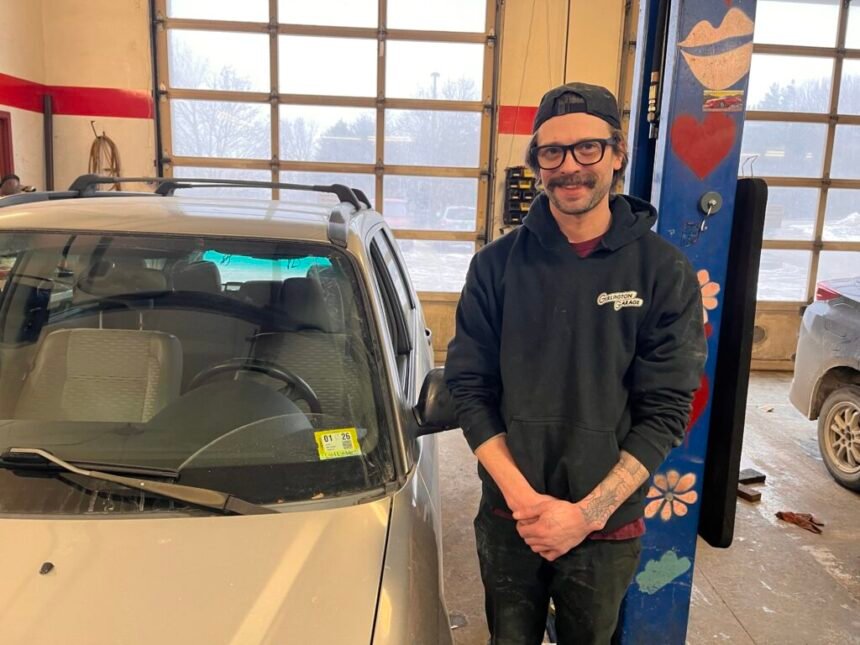A lot of state laws changed at the start of the new year. Twenty-one states raised their minimum wage. New York began offering prenatal leave to pregnant people. Washington state banned the sale of cosmetics that have been tested on animals. And Texas eliminated the requirement that cars pass a safety inspection every year to stay on the road.
The Lone Star State joins others that have done away with required safety inspections, including Utah, New Jersey and Florida. And while 29 states still require annual emissions tests, just 15 — plus the District of Columbia — still make drivers get a regular once-over to ensure that their car is in decent shape, according to Kelley Blue Book.
That leaves a patchwork of rules across the country, impacting drivers and auto repair businesses.
One state with more stringent inspection rules is Vermont. That’s where technician Max Berlow raised a 2006 Subaru Forester on his lift one recent Thursday morning. Berlow works at Girlington Garage, a repair shop in South Burlington.
In the state’s snowy climate, road salt does a good number on cars and trucks every winter. So checking for rust is a big part of a required annual inspection.
“Basically, if you can put your finger through it, that’s bad,” Berlow said. The rust on the underside of the Forester hadn’t come to that point. But to check, Berlow tapped around with a screwdriver.
“So, it’s flaky,” he said. “There’s some flakes coming off. But it hasn’t, like, totally destroyed the integrity of it.”
Good enough.
Berlow also tested the headlights and windshield wipers and removed a wheel to check for rust buildup on the brakes.
After about an hour, he determined it passed — and put a sticker in the corner of the windshield, good for another year. Total cost: about 84 bucks.
“We catch things before they fail, so you don’t have breakdowns,” explained Demeny Pollitt, the owner of Girlington Garage.
Inspections aren’t a bad business to be in, she acknowledged. She estimated her shop does 30 to 40 a month. And, much of the time, if something needs to get fixed to pass inspection, customers will stick with them to get the work done. But, Pollitt said, “we are always really clear with people: If we fail you for something, you do not have to get it fixed with us. You can bring it anywhere you want.”

The inspection process in Vermont is not exactly popular with drivers, including Thomas Dunbar, a high school teacher in Cabot.
Years ago, he said, he took his leased Toyota Yaris in for an annual inspection, “and they told me that my brake pads were too thin.”
So he went back to the dealership, over the border in New Hampshire, where he was told his brakes were fine. Then, he said, he went to a different Vermont mechanic, who passed him. But he had to pay for both inspections — the pass and the fail.
“It just feels like it’s easy to be taken advantage of,” Dunbar said.
That was essentially the argument of state lawmakers in Texas who in 2023 did away with that state’s safety inspection requirement as of the first of this year. In a statement to Marketplace, Republican state Rep. Cody Harris, who sponsored the bill, called inspections “a waste of time for Texas citizens” used by “some shady dealerships to upsell consumers with unnecessary repairs.”
What Texas did keep is an annual fee drivers have to pay the state. Previously, it covered the cost of the safety inspection.
“They’re paying for something that they’re not getting, and we have now eliminated something that did a lot to improve the safety of the roads,” said Charissa Barnes of San Antonio.
The new law had a personal impact on Barnes. It upended her decades-old family business, a chain of inspection stations in the San Antonio area. The company once had 10 locations, each one a metal building painted like a Texas flag. They had a single bay that drivers could pull into and get their inspections done fast.
“We created an entire procedure and process on how to inspect it, and we can get you out in nine minutes,” Barnes said.
All of Barnes’ inspection stations are now closed. She’s shifted her attention to another business focused on vehicle registrations, but she thinks eliminating inspections was a mistake.
“What I’m very concerned about is that, because we no longer have an annual safety inspection, cars are just going to be unsafe,” she said.
Whether requiring an annual inspection actually reduces the number of crashes is not totally clear. Subasish Das, an associate professor at Texas State University, studied this question in 2019.
“We did not find any evidence that states with inspection improved safety,” he said.
But Das’ study only looked at data on fatal crashes, available from the federal government. Since it did not include nonfatal incidents, he said, the subject needs more research.
Whether or not your state requires you to get your car checked out by a professional, it’s never a bad idea, said David Bennett, a senior manager at the American Automobile Association. But, he said, without a requirement, a lot of drivers tend to put off regular maintenance — replacing burned-out headlights or worn-out tires, for example.
“When you start avoiding some of those things, something’s going to break down, more than likely, and then that cost is going to be more than if you just maintained it overall,” Bennett said.
As for taking advantage of inspection customers, Demeny Pollitt in Vermont said at least at her shop, it doesn’t happen.
“Cars, especially in Vermont, have lots of problems. We do not have to make up problems in order to do business and be successful,” she said.
There are some bad apples out there, but when your mechanic says your car won’t pass inspection, Pollitt said, they’re usually not trying to rip you off.
There’s a lot happening in the world. Through it all, Marketplace is here for you.
You rely on Marketplace to break down the world’s events and tell you how it affects you in a fact-based, approachable way. We rely on your financial support to keep making that possible.
Your donation today powers the independent journalism that you rely on. For just $5/month, you can help sustain Marketplace so we can keep reporting on the things that matter to you.











